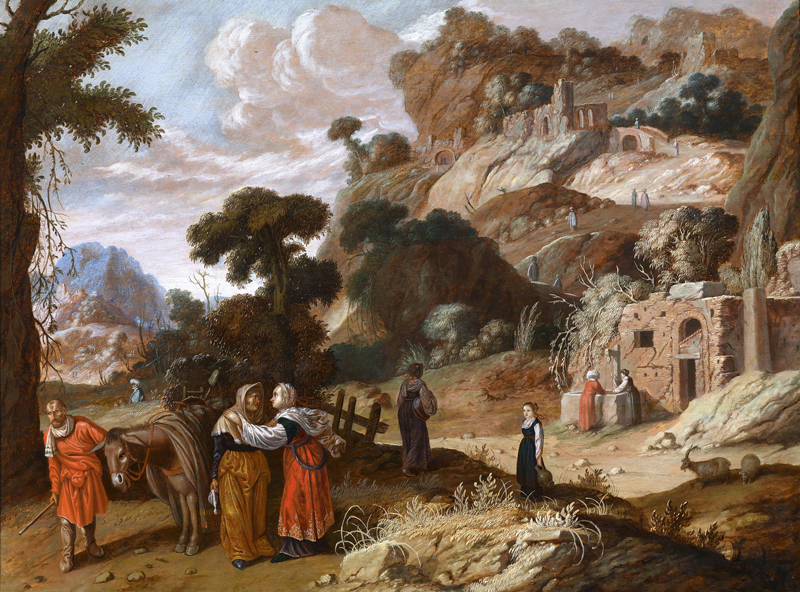A sermon on Ruth 1:1-19, for Kensington Community Church, in San Diego, CA.
Months into the “two-week-long” COVID lockdowns, the poet Kashif Andrew Graham posted this poem on his Instagram page:
And for a good while, I could not get that second line out of my head—”soul tired,” what a perfect way to describe how lonely it feels when you barely leave your house for weeks, when your kitchen table becomes your home office and virtual school classroom and church sanctuary and everything else, 24/7. At least personally, a theme for the whole pandemic has been that–no matter how much my work load has remained unchanged, everything just feels… so much more tiring. Soul tiring.
In the beginning of all this, I started seminary, virtually. And I’ve got to tell you folks, online seminary is the exact thing it took to convince me of one of the truths this scripture passage can reveal to us: that religion is not something we are meant to do alone.
You can read all the books about scripture you want, but it is just so much more… lifeless when it’s all online. I like, barely made it through my first semester, because how in the world am I supposed to care about the history of the creeds and about church fathers who would be shocked that we have women in charge of things sometimes, and all that stuff when it’s just… words on a computer screen?
And then last year, in 2021, as pandemic restrictions started to lift, we started getting opportunities to go in-person and oh my goodness, the world just changed. It got so much easier to do all the reading and to write all the papers, because it was about stuff I’d sat face-to-face and talked about with other people who’ve got the same doubts, fears, questions, trauma, and affection for liturgical-themed nail polish colors that I do!
I’m in a program that really prizes interreligious engagement. We learn about church history both in the traditional, church-taught, way and with input from Muslim and Jewish scholars on who can provide honest perspectives on the way Christianity has not been a force for good when it bumps up against their traditions. We learn about the Christian Old Testament side-by-side from both Christian theologians and Rabbis who offer a perspective on how their traditions interpret the same texts differently.
One of the deans there kind of half-jokes that her goal is to leave Christians, the majority religion in the US, with a little epistemic humility–that we learn to ask ourselves “have you considered that you might be wrong?” a little bit more often. I love that, from the bottom of my heart–it’s why I chose the school I did. But it’s also not something that is easy to do in asynchronous online courses… it’s got to be live, in real time, with 3D faces to work well. Really, that’s probably true for just about everything we do with religion.
##
There are a thousand different sociologists’ definitions of religion as a social category, but one of the more common ones is that it’s a charismatic authority which a community builds into a legitimate authority. That is to say, it’s something that starts with an experience with the transcendent, that people come around together, and those people then build into something that has something to say about how you live your life.
The passage Joe just read is the opening to the book of Ruth, a short story found in the portion of the Hebrew Scriptures that Christians have adopted as canon. In Jewish canon, it’s grouped with the five megillot, or scrolls—a collection of books that, liturgically, accompany Jewish festivals. The book of Ruth accompanies the festival of Shavuot, a fall harvest festival that celebrates the giving of the Torah and the blessings of harvest. It’s also sometimes shared as the story of the first “convert” to Judaism–Ruth.
The book of Ruth is short. In the beginning, Israel experiences a famine, so Naomi and her husband move out of Israel, and their sons marry non-Israelites. Then all the men in the story die–just like a good Disney tale, it starts off with a tragedy–and only the women: one Israelite, and two Moabites, remain. The famine ends, and Naomi the Israelite begins to venture back to Israel. She blesses and releases her Moabite daughters-in-law, telling them to head back to their own people, to their “homes,” to the places where they are more comfortable. “No need to care for your ol’ mother-in-law anymore, just leave me on my way.”
Ruth, one of the daughters-in-law, says “no way!” and commits to a life of loyalty to her mother-in-law.
The rest of the book is a story about Ruth and Naomi’s redemption, about their being liberated from poverty. “God” rarely shows up in the story, but when God does show up, the presence of God is revealed not through fantastical, supernatural experiences, but through the care of ordinary people.
The two show up in Israel, poor as dirt. Naomi experiences what today we would probably call chronic depression, and Ruth goes out to glean–to get leftover harvest–in the barley fields. She winds up gleaning from the fields of their local 1%er, Boaz, who tells his workers to make sure there’s always plenty of leftovers for her.
Then, there’s this kind of wild scene where Naomi tells Ruth to like, flirt with Boaz, and kind of implicitly make a marriage proposal. I’m oversimplifying a really great story here–you deserve to read it for yourself some time–but it ends with Boaz stepping up to marry Ruth, and commit to share his fortune with her and Naomi.
The genre of Ruth is legend; it’s something that was kind of passed down through generations. Something you tell as a story that maybe had some inspiration in history, but was not intended to be historical. It reads like a storybook. “In the days when the chieftains ruled,” it starts. The names are all references to what role the characters play in the story: Elimelech means “my God is king.” Naomi means “my delight,” though later when she’s upset she’ll tell people to start calling her a name that means “bitterness.” Mahlon means “sick,” and Chilion means “pining,” two names that you only give a kid if their whole job is to die in the exposition.
And when I hear something is a legend, I start to ask “why” questions. Why write this story, why tell this story, why preserve this story? What function does this story serve in the communities that call it sacred?
A reconstructionist Rabbi whose writing I follow, Richard Hirsch, describes the book of Ruth as a story of citizenship. Of someone who doesn’t just live among the Israelites–something that would not have been unheard of–but who “converts” by committing to mutual care with an Israelite. And in that committing of mutual care, Ruth joins the Israelite people, she shares in acts of Chesed, of lovingkindess with her Israelite neighbors, and she herself receives lovingkindness, too. Ruth moves from “daughter-in-law to an Israelite woman” to “one of us.”
And in the end, the legend has it, she winds up being the ancestor of King David. In Christian tradition, we say that makes her the ancestor of Jesus, too.
All because she’s an outsider who pledged loyalty to an aging mother-in-law, an outsider who the community then said “yes, come in!” to.
##
There’s this thing that psychologists call imposter syndrome, and its when you feel like you’re kind of inadequate, like you’re not quite qualified for what you’re doing, even despite evidence that you are indeed doing the right thing.
It’s the feeling I get at my day job, when I’m objectively successful—when my work is making a real impact, my team says I’m doing a good job, my boss and colleagues and even our board support my work—but budget season comes, and I remember just how bad I was at algebra in high school, and start to feel like maybe this isn’t something a 29-year-old who went to a liberal arts college with no math requirement should be allowed to do. Maybe I’m not really meant to be a leader.
It’s the thing I feel every time I wear this collar—and it’s the reason I choose to wear the collar, too! I tell myself I don’t like wearing it because I’m a terrible driver and I’m afraid someone will like, lose faith in God after seeing someone in a clergy collar speeding or do a horrible job parking. (Which is totally true, by the way. My car insurance is so expensive.) And that’s part of it. But part of it is also that I’m never quite sure it’s okay to be so bold as to make a claim to being able to speak on behalf of God and God’s people, which is traditionally what the collar implies. We call it a clerical collar, but historically they’re like of “descended from” preaching collars—the same tradition that led to the collars Supreme Court Justices wear when in their official capacities. It’s a collar that says “in this moment, I am aiming to represent a perspective that is not just my own, but a communal one, an official one,” in a way that should rightly intimidate anyone.
It’s something that is experienced by all kinds of people, but especially people from marginalized communities, who are reconciling stories they’ve been told about their own “rightness” for power and authority in light of the reality that they are, indeed, doing it. You hear about it most often from women in advanced roles, from Black, indigenous, and people of color in advanced roles, things like that.
It’s something that you can imagine Ruth maybe would have felt, entering a new nation as a poor woman, asking folks to care for her, a foreigner, and later, kind of implicitly asking an Israelite to marry her in what surely would have felt like a breaking of norms even today—we still don’t often see women ask men for their hand in marriage.
There’s lots to say about how you respond to that psychologically, and I am no therapist.
But I will say one thing about it in church context: when we’re in Christian communities, we aren’t supposed to do things we can do alone. Jesus invites us around his table to do the kind of things that we can only do together. The things we can only do as a church.
We’ve been talking a lot about the Kingdom of Heaven lately, and one important thing that “Kingdom” language implies, is that it involves business that cannot be done alone. We cannot do push back against the forces of evil alone. We are a pursuing an upside-down Kingdom, a singular Kingdom of Heaven where God’s law reigns. We are not lone justice-warriors fighting for our own causes. God invites us, and we invite one another, to do brave things: to seek care and give care in ways we could not do alone; to be a light in the world that is bright in ways we cannot be bright alone; to seek the treasure of God’s law together. To transform hearts and lives in our neighborhoods in ways none of us could do alone.
And if we’re not doing things that make us feel a little like imposters, I suspect we aren’t doing the work of the Kingdom of Heaven yet.
Amen.

